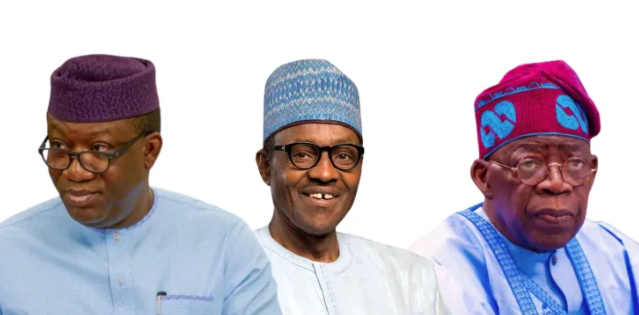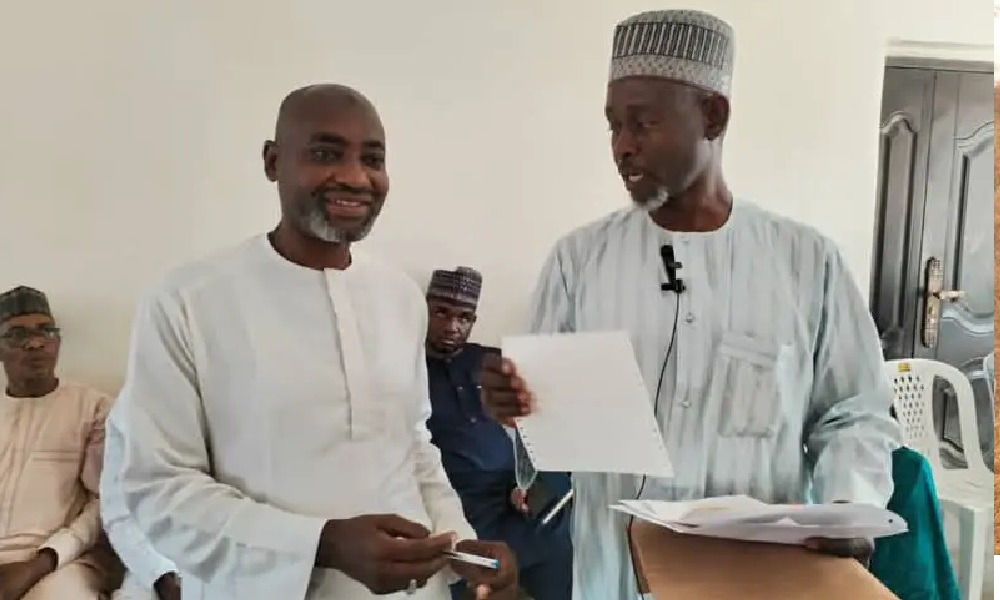News
Why things went wrong despite Tinubu’s good economic policies – Fayemi

By Kayode Sanni-Arewa
Although Mr Fayemi assured that “things will begin to improve” as the Tinubu-led government “has only been in office for one year,” he maintained that “if things don’t improve, then Nigerians reserve the right to decide what they want to do with us (APC).”
Former Ekiti State Governor Kayode Fayemi reviewed President Bola Tinubu’s key economic policies on Friday, which he admitted have taken a toll on the living conditions of Nigerians in the first year of his administration.
He referred to the removal of fuel subsidy and the convergence of Nigeria’s foreign exchange platforms announced by President Tinubu in his inauguration speech on 29 May last year.
Mr Fayemi said that although the policies were appropriate, the administration was unduly hasty with their implementation because it did not prepare adequately for the fallouts.
“I think there were some missteps, not that the policy changes are wrong,” Mr Fayemi, a top member of the ruling All Progressives Congress (APC), said while appearing on Channels Television’s Politics Today on Friday.
The former Minister of Solid Mineral Development during the first term of the immediate past President Muhammadu Buhari acknowledged that the Tinubu administration inherited challenges from the previous one, which, he said, made the policy changes necessary.
“I actually think the policy changes made were the appropriate policy changes, but the announcement at the inauguration was a little bit precipitate and did not allow for enough room to prepare the ameliorating circumstances that would address the challenges that were bound to come in terms of inflation with the fuel subsidy removal and foreign exchange convergence. And from then, we seem to have gone downhill,” Mr Fayemi said.
The Tinubu administration began implementing the subsidy removal policy on its first day in office, strikingly announcing “subsidy is gone,” in his inauguration address in May last year. However the administration waited for about two weeks before floating the naira to achieve a convergence of exchange rates across platforms.
But, since then, the one-year-old administration of Mr Tinubu has been battling to deal with! the fallout of the policies, including skyrocketing inflation with attendant high living costs.
Who is to blame?
The former governor, who was one of the 22 presidential aspirants that jostled for the APC presidential ticket with Mr Tinubu ahead of the 2023 presidential election, blamed political leaders across the country for the economic hardship Nigerians are grappling with as a result of the policies.
“The political leadership in the country definitely cannot absolve itself of the deteriorating factor of the economic challenges we are facing, and yes, ordinary Nigerians should blame us and hold us to account for not making their lives better,” said Mr Fayemi, who withdrew in the middle of the APC presidential primary election in 2022 to back Mr Tinubu.
But cautioning against generalising the country’s “macroeconomic challenges”, he said each tier of government contributed to the state of Nigeria’s economy.
“Yes, we are a federation and there is a central government which gets to take responsibility, for fiscal policies particularly and monetary policies, as well. But you also must find a way to look at variations in what is happening at the federal centre and in various states to draw a full picture of our trajectory in the democratic journey,” he said.
He also noted that government officials recognised the problems and are “trying to address that to the best of their ability.”
Tinubu, Fayemi’s political, APC journey
Messrs Tinubu and Fayemi are allies dating back to the military-era struggle to restore democratic governance.
Mr Fayemi enjoyed the support of Mr Tinubu, a former Lagos State governor, to become the Ekiti State governor between 2010 and 2014.
They remained solid allies until they started having a strained relationship after Mr Fayemi lost his bid to win re-election as the incumbent governor in 2014.
Many believe that the gulf between them widened after the APC won its first presidential election and Mr Fayemi became the Minister of Solid Mineral Development during the Buhari presidency in 2015.
He remained a minister until 2018, when he resigned to re-contest and won the Ekiti State governorship election for a second term.
The APC foundation member has been unable to restore the relationship between him and the president to its good time.
Between APC’s promises and delivery
The former chairperson of the Nigeria Governors’ Forum between 2019 and 2022 also assessed APC’s delivery on its promises to Nigerians while campaigning to take the presidency in 2015.
“Am I worried about the way things have gone so far? Certainly,” Mr Fayemi said. “I am a foundation member of this party; I was one of those who drafted the original manifesto that we sold to Nigerians in 2015.”
He said as the director of policy in the 2015 campaign that brought then President Buhari to office, he was familiar with “the vision we shared with Nigerians”.
“I believe our party is still committed to that, but we have fallen short in the relationship between party and government,” he said.
‘Nigerians will decide APC’s future’
He said on Friday that Nigerians would decide the future of their party depending on their assessment of its performance since 2015 when it gained power.
“The reality must also be confronted that the Nigerian people in a democracy have the last word. If they are not happy with our political party, then they have to take the decision on that front,” he said.
Although he assured that “things will begin to improve” as “the government has only been in office for one year,” he maintained that “if things don’t improve, then Nigerians reserve the right to decide what they want to do with us.”
Lapses in APC
Mr Fayemi pointed out lapses in the running of the APC, which he said robbed the party its capacity to hold the government it helped to install accountable.
“We don’t even have the necessary organs within our party functioning as well as they should,” he said, noting that the party has not had its national executive committee, caucus, and elders council.
“So clearly, there are things that the party needs to do that ought to hold the government to account,” the former governor said.
The APC is a product of the merger of three legacy political parties – Action Congress of Nigeria (ACN), Congress for Progressive Change (CPC) and All Nigeria Peoples Party (ANPP) – alongside some defectors from the then ruling Peoples Democratic Party (PDP) in 2013.
The party adopted as its core ideology social democratic welfarism which aims to ensure participatory democracy and controlled regulation of the economy in favour of public interest.
Premier Times
News
Port Harcourt refinery: NNPCL disowns recruitment notice

The Nigerian National Petroleum Company Limited (NNPCL) has disclaimed a purported recruitment announcement for the Port Harcourt Refining Company (PHRC), warning the public against falling victim to fraudulent schemes.
In a statement released on its official X handle (formerly Twitter) on Friday evening, the oil company clarified that no separate recruitment process was ongoing for PHRC beyond the one initiated in 2024.
The statement, titled “NNPC Ltd Disclaims Purported Recruitment Announcement for PHRC,” was signed by the Chief Corporate Communications Officer, Olufemi Soneye.
“The Nigerian National Petroleum Company Limited (NNPC Ltd) has urged members of the public to discountenance purported recruitment announcement for the Port Harcourt Refining Company (PHRC) circulating in certain online platforms,” the statement read.
NNPC Ltd further explained that its recruitment process, which commenced last year, covered all its subsidiaries, including PHRC. The company noted that candidates who passed the Computer-Based Aptitude Test were proceeding to the interview stage.
“The purported recruitment link being circulated in various online platforms is the handiwork of fraudsters who are keen on taking advantage of the newly revamped Port Harcourt Refinery to fleece unsuspecting members of the public with a phantom recruitment announcement. We, therefore, call on members of the public to be wary of the ploy and not fall for it,” the statement warned.
News
Hajj 2023 refund: Pilgrims from Adamawa get N61,080 each

The Adamawa State Muslims Pilgrims Welfare Commission has disbursed N61,080 to each of the 2023 pilgrims from the state over poor services rendered to them by the service providers while in Saudi Arabia.
The executive secretary of the pilgrims commission, Malam Abubakar Salihu, disbursed the refunded money, saying it was a step of accountability.
The disbursement was paid into the account of the pilgrims or, for those without account numbers, through the local government schedule officers of the 21 local governments of the state.
Responding on behalf of the beneficiaries, Alhaji Shuaibu Musa Mele appreciated the commission for ensuring that each pilgrim gets his rightful refund.
The Kingdom of Saudi Arabia had earlier refunded money through the National Hajj Commission of Nigeria, for sharing among the 36 states of the country.
News
Security operatives destroy Bello Turji’s food storage facility

A school building in Fakai village, reportedly used as a food storage facility by the notorious bandit leader Bello Turji, has been destroyed.
The facility, which had been stocked with large quantities of food supplies, was completely razed, leaving the structure in ruins.
According to local sources, the school was repurposed by the bandits to support their operations in the region.
It served as a key logistical hub for storing essential supplies, ensuring the group’s ability to sustain its activities over time.
The destruction of the stockpile is seen as a major setback for Bello Turji’s network. By eliminating a critical resource hub, the operation is expected to disrupt the group’s supply chain and hinder their ability to operate effectively in the area.
Counter-terrorism expert Zagazola Makama reported that the incident underscores ongoing efforts to counter the influence and operations of bandit groups in the region.
Residents of Fakai village and surrounding areas hope this effort signals further strides toward restoring peace and security.
-

 News22 hours ago
News22 hours agoJust in: Again , Petrol Price Increases To N1150 Per Litre Nationwide
-

 News22 hours ago
News22 hours agoSad: Ex-Delta First Lady, former beauty queen, dies in London hospital
-

 News21 hours ago
News21 hours agoUK Court Jails 35-yr-old Nigerian 10 Yrs After Brutal R3pe Of Woman In Nottingham
-

 News22 hours ago
News22 hours agoSEE Dollar (USD) to Naira Black Market Rate Today January 18, 2025 Aboki
-

 News13 hours ago
News13 hours agoJust in: Gov Soludo reveals those behind kidnapping in SE, says it’s now a lucrative biz
-

 News21 hours ago
News21 hours agoTinubu Exhausted N9.74bn Supplying Rice, Beans Palliatives To Nigerians In 2024 – Report
-

 News18 hours ago
News18 hours agoPolice declare Ex-President Jonathan’s aide , Reno Omokri wanted
-

 News15 hours ago
News15 hours agoSad! Train Crushes Man To D3ath In Oshodi, Lagos








